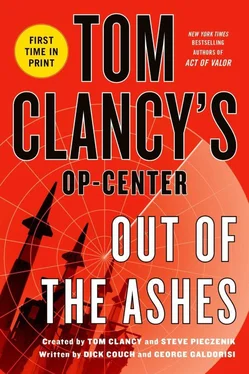Someone did, in fact, know about Azka Perkasa and his personal life — and a great deal more. Over the course of the past several weeks, he had come to the attention of a bespectacled man in a small, sparsely appointed office crammed with computers, cables, and keyboards. The office was in the basement of the National Geospatial-Intelligence Agency, and still smelled of fresh paint and drywall paste. It was Op-Center’s new, but still under-construction, headquarters, and the man’s name was Aaron Bleich. He had been one of Op-Center’s first hires, and his services cost the new organization more in annual salary than the president, with a substantial up-front signing bonus. Yet in the multifaceted world of information, Aaron Bleich was worth his weight in gold — literally — and he was the first of his kind to be hired by Op-Center. He was given the equipment he demanded and put in a room with a single mission: Find who was responsible for the stadium bombings. This he had done. With official, and some nonofficial, access to law enforcement and intelligence-agency databases, he had, in his words, “laid hands on” his beloved suite of computers and found Azka Perkasa. Next, he traced and documented his movements back to and before the bombings. Just as soon as he knew, Chase Williams knew.
Perkasa’s condo was on the forty-fourth floor and looked out over the expanse of the extended port area and the Strait of Malacca. There was a smog-induced haze that partially obscured the Aerospatiale helicopter that was hovering a half mile offshore. The helo was draped in civilian markings, but it was the property of the Grup Gerak Khas — the 10th Paratroop Brigade of the Indonesian Special Forces. It was a crack force trained in part by the 1st Special Forces Group. The Grup Gerak Khas was partial to the Green Berets from Fort Lewis in Washington State, and posed no questions when asked if a sanitized helicopter could be made available for a few hours. Earlier that day, an unmarked, extended range Gulfstream V had landed at Kuala Lumpur International and taxied to a remote hangar. Two pilots from the 160th Special Operations Aviation Regiment and two snipers from the Op-Center JSOC troop stepped from the Gulfstream and quickly boarded the fully fueled French helicopter. They took off immediately.
If Azka did not clearly see the helo from the perch in his condo, the shooter behind the stabilized optics saw him. The optics were married to a CheyTac.408 rifle with a point-designated sighting system. After the target had been identified by the system’s laser range finder and target designator, the weapon would not fire unless the gun was on target — precisely on target. Once the shooter had identified his target, Azka’s head, and pressed the trigger, he wavered around a bit until the crosshairs momentarily rested on the Azka’s lazy left eye. The CheyTac bucked, and two seconds later a 210-grain round came through the plate glass and into Azka’s right nostril. Still traveling at twenty-four hundred feet per second, the heavy slug tore into his skull, causing it to explode and paint the inside of his home office with cranial tissue and brain matter.
His body was found later that day. By that time, the Gulfstream, the two shooters, and the two pilots were out over the Indian Ocean, well on their way to a fueling stop at Diego Garcia.
* * *
Chase Williams was standing on the tarmac at Pope Air Force Base shortly after sunrise when the JSOC team emerged from their aircraft. Major Mike Volner let his weary troop disembark first and was last off the plane. While only a portion of the team were used to make the airborne hit on Perkasa, Volner had taken his entire troop downrange to set up the necessary coordination and command and control
Williams shook hands with each of the team members, and then paused to speak with Volner. “Well done, Major. I read your reports but am looking forward to you debriefing my staff in person. You carried this out superbly and we’re all enormously proud of you.”
“Thank you, Admiral. It was a great team effort. The intel your Geek Tank provided was spot on, the Pacific combatant commander gave us everything we needed, and we couldn’t have asked for better support. We’ll be standing by for our next assignment. And sir, if you don’t mind me saying so, thank you for coming all the way down from Washington to meet us. I know you’re busy and this was an unexpected surprise.”
“I’m never too busy to recognize a job well done, Major. We may not be far from pinning down the location of the bastard who perpetrated these attacks. I’d like to give your boys the R&R they deserve after what you’ve just accomplished, but I’m going to have to ask you to keep them on twenty-four-hour standby.”
“We can do that, Admiral. I’ll give them the afternoon and evening off once we get back to Fort Bragg. Any idea where we’ll be heading for our next mission, sir?”
“I can’t tell you for sure, but I think you might want to break out your desert camis.”
“Works for me, Admiral. We’ll be ready when you call us.”
* * *
The next day, Chase Williams assembled his skeleton staff in the basement of the National Geospatial-Intelligence Agency. He complimented them on their efforts in orchestrating the hit on Azka Perkasa and thanked them for how quickly they had gotten Op-Center up and running.
That done, his face hardened, and he was all business. “Ladies and gentlemen, I’m going to give it to you right between the running lights. Our JSOC team performed superbly and did everything we expected of them. We all should be proud to work with pros like Major Volner and his troop.”
Williams paused to frame his thoughts.
“That said, we need to mine the lessons learned from what just happened. Getting our team surged into theater was not a smooth operation. Not all the gear they needed got to them in time and they had to do work-arounds to make their mission succeed. Getting them back here wasn’t much better, and we could have reunited them with their families a day sooner if we’d been on the ball.”
Heads nodded. The staff knew where they had fallen short.
“I think we’re finding the limits of the talent we have onboard Op-Center right now,” Williams continued, his tone softening. “There are certainly areas where I’m out of my depth, and I think it’s also clear the kind of folks we should hire as we continue to staff up. Now, here’s what we need to do to get ready for our next mission.”
* * *
Once Aaron Bleich had a complete profile of Azka Perkasa, it did not take him long to connect him to Abdul-Muqtadir Kashif — and Kashif’s role in financing the bombings. There were just enough phone calls and money wire transfers to connect Kashif, the Lebanese, and Perkasa. As good as he was, Bleich had to admit that luck did play a part in his success. While Kashif and Perkasa had been circumspect and careful to a fault, save for the short phone call between Perkasa and Kashif, their Lebanese intermediary had been sloppy, even cavalier, with his phone and e-mail communications. It was just enough to finger Kashif.
Shortly following the death of Perkasa, of which he had no knowledge, Kashif was with his wife’s father’s brother in a warehouse outside Beirut. He was checking the false loading documents for a shipment of goods from Marseilles that would arrive by shipboard container the following day. Kashif normally did his best to stay away from the working end of this part of his business, but sometimes he had to make himself visible for the sake of appearances.
This uncle was a scoundrel by any measurement, yet Kashif genuinely liked the old smuggler. He had a sense of himself and of their enterprise he found refreshing. The old man was smart, and Kashif knew no small amount of what he had accomplished financially was due to the help and guidance of this wily relative.
Читать дальше












